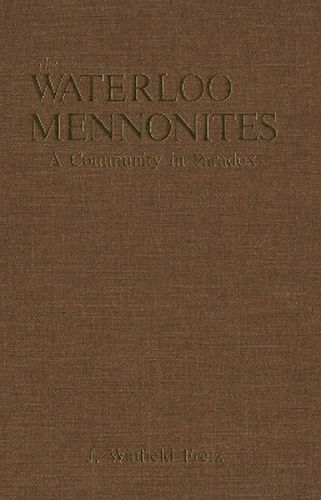Readings Newsletter
Become a Readings Member to make your shopping experience even easier.
Sign in or sign up for free!
You’re not far away from qualifying for FREE standard shipping within Australia
You’ve qualified for FREE standard shipping within Australia
The cart is loading…






The Waterloo Mennonites is truly a communal book: the substance treats the communal aspect of the Mennonite community in all its complexity, while the book itself came about through communal effort from the students and researchers assisting Fretz, the various organizations and individuals providing support, the larger community including the two universities and Wilfrid Laurier University Press, and public funding agencies.
This book seeks to derive a clearer understanding of the sociological characteristics of a single Mennonite community, beginning with the historical and religious background of the Waterloo Mennonites, reviewing their European origins, their ethnic identification, and their immigration experience. It also examines their basic institutions: religion and church, marriage and the family, education and the school, economics and earning a living, government and how they relate to it, their use of leisure time and methods of recreation. It also looks at the way Mennonites interact with the larger society and how that society responds.
$9.00 standard shipping within Australia
FREE standard shipping within Australia for orders over $100.00
Express & International shipping calculated at checkout
The Waterloo Mennonites is truly a communal book: the substance treats the communal aspect of the Mennonite community in all its complexity, while the book itself came about through communal effort from the students and researchers assisting Fretz, the various organizations and individuals providing support, the larger community including the two universities and Wilfrid Laurier University Press, and public funding agencies.
This book seeks to derive a clearer understanding of the sociological characteristics of a single Mennonite community, beginning with the historical and religious background of the Waterloo Mennonites, reviewing their European origins, their ethnic identification, and their immigration experience. It also examines their basic institutions: religion and church, marriage and the family, education and the school, economics and earning a living, government and how they relate to it, their use of leisure time and methods of recreation. It also looks at the way Mennonites interact with the larger society and how that society responds.